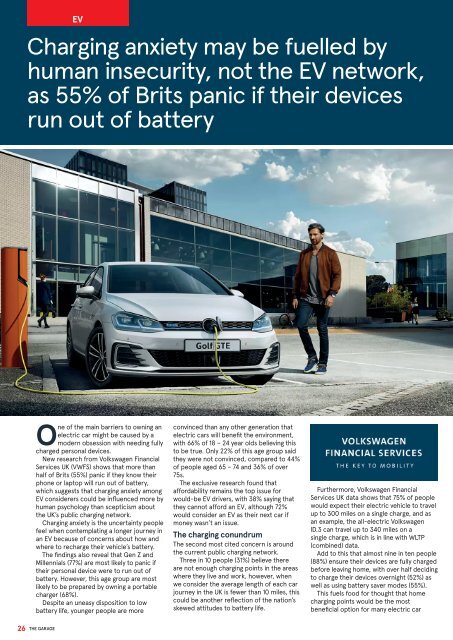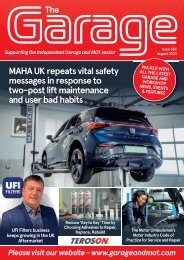The Garage 341
You also want an ePaper? Increase the reach of your titles
YUMPU automatically turns print PDFs into web optimized ePapers that Google loves.
EV<br />
Charging anxiety may be fuelled by<br />
human insecurity, not the EV network,<br />
as 55% of Brits panic if their devices<br />
run out of battery<br />
One of the main barriers to owning an<br />
electric car might be caused by a<br />
modern obsession with needing fully<br />
charged personal devices.<br />
New research from Volkswagen Financial<br />
Services UK (VWFS) shows that more than<br />
half of Brits (55%) panic if they know their<br />
phone or laptop will run out of battery,<br />
which suggests that charging anxiety among<br />
EV considerers could be influenced more by<br />
human psychology than scepticism about<br />
the UK’s public charging network.<br />
Charging anxiety is the uncertainty people<br />
feel when contemplating a longer journey in<br />
an EV because of concerns about how and<br />
where to recharge their vehicle’s battery.<br />
<strong>The</strong> findings also reveal that Gen Z and<br />
Millennials (77%) are most likely to panic if<br />
their personal device were to run out of<br />
battery. However, this age group are most<br />
likely to be prepared by owning a portable<br />
charger (68%).<br />
Despite an uneasy disposition to low<br />
battery life, younger people are more<br />
convinced than any other generation that<br />
electric cars will benefit the environment,<br />
with 66% of 18 – 24 year olds believing this<br />
to be true. Only 22% of this age group said<br />
they were not convinced, compared to 44%<br />
of people aged 65 – 74 and 36% of over<br />
75s.<br />
<strong>The</strong> exclusive research found that<br />
affordability remains the top issue for<br />
would-be EV drivers, with 38% saying that<br />
they cannot afford an EV, although 72%<br />
would consider an EV as their next car if<br />
money wasn’t an issue.<br />
<strong>The</strong> charging conundrum<br />
<strong>The</strong> second most cited concern is around<br />
the current public charging network.<br />
Three in 10 people (31%) believe there<br />
are not enough charging points in the areas<br />
where they live and work, however, when<br />
we consider the average length of each car<br />
journey in the UK is fewer than 10 miles, this<br />
could be another reflection of the nation’s<br />
skewed attitudes to battery life.<br />
Furthermore, Volkswagen Financial<br />
Services UK data shows that 75% of people<br />
would expect their electric vehicle to travel<br />
up to 300 miles on a single charge, and as<br />
an example, the all-electric Volkswagen<br />
ID.3 can travel up to 340 miles on a<br />
single charge, which is in line with WLTP<br />
(combined) data.<br />
Add to this that almost nine in ten people<br />
(88%) ensure their devices are fully charged<br />
before leaving home, with over half deciding<br />
to charge their devices overnight (52%) as<br />
well as using battery saver modes (55%).<br />
This fuels food for thought that home<br />
charging points would be the most<br />
beneficial option for many electric car<br />
26 THE GARAGE<br />
26,27 EV Charging.indd 1 28/07/2022 15:10


















